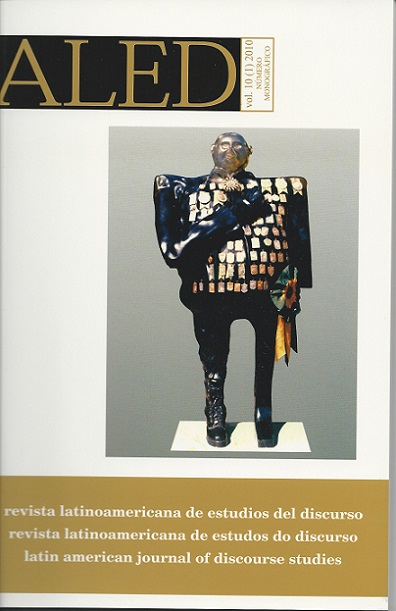¡CON LA IGLESIA HEMOS TOPADO…!
Aspectos de una interacción polémica entre el Presidente Chávez y el Cardenal Urosa Savino
DOI:
https://doi.org/10.35956/v.10.n1.2010.p.35-63Keywords:
insult. politeness. church-state relationship.Abstract
Relations between Church and State have not been harmonious in Venezuela, and the conflict has deepened during the government of Hugo Chávez. This paper studies a macro speech act consisting of Chavez’s insult towards Cardinal Urosa Savino and his reply. Drawing on Critical Discourse Analysis and Politeness Theory, we observe the complexity of this episode, which has civil, religious and diplomatic implications. Also, due to the institutional weight of the speakers it also has an important perlocutionary effect. As noted by Jucker y Taatsvisainen (2000), insults are defined by the reaction of the interlocutor. In the present case, the reaction was a strong response from the bishop, noting that the issuer had no right to offend, and followed by criticism towards the issuer. Neither one of the partners is polite. Neither one of them has an interest in resolving the conflict amicably.
Downloads
References
Acevedo Linares, A. (2010). La tolerancia como presupuesto fundamental para la construcción de una cultura de la democracia en América Latina. Disponible en: http://www.monografias.com/trabajos11/tole/tole.shtml. Consulta:17/08/2010.
Álvarez, A. (2005). Cortesía y descortesía. Teoría y praxis de un sistema de significación. Mérida: CDCHT-Universidad de Los Andes.
Álvarez, A. (2009). ‘Anticortesía y política’. Lengua y Habla 13.19-33. Disponible en: http://erevistas.saber.ula.ve/index.php/lenguayhabla/article/ view/1031/1003. Consulta: 17/08/2010.
Bolet, F. J. & Barrera, L. (2004). ‘Iglesia Católica y gobierno venezolano en la diatriba pública: estrategias discursivas de poder, autodefensa y ataque’ Signos 37. (56) 7-21.
Bello, A. (1972). Gramática. Caracas: Ediciones del Ministerio de Educación.
Blas Arroyo, J.L. (2001). ‘No diga chorradas… La descortesía del debate político cara a cara, una aproximación pragma-variacionista’. Oralia: Análisis del discurso oral 4. 9-46.
Bolívar, A. (2001). ‘El insulto como estrategia en el diálogo político venezolano’. Oralia: Análisis del discurso oral 4. 47-74.
Bolívar, A. (2003). La descortesía como estrategia política en la democracia venezolana, en Bravo, D. (ed.). Actas del primer coloquio del programa EDICE.
La perspectiva no etnocentrista de la cortesía: identidad sociocultural de las comunidades hispanohablantes. Estocolmo: Universidad de Estocolmo, en CD Rom, 213-226.
Bolívar, A. (2008). ‘“Cachorro del imperio” vs. “cachorro de Fidel”: los insultos en la política latinoamericana’. Discurso y Sociedad 2 (1): 1-38. Disponible en: http://www.dissoc.org/ediciones/v02n01/DS2(1)Bolivar.html. Consulta: 11/10/10.
Bolívar, A. (2009). ‘¿Por qué no te callas? El alcance de una frase en el (des)encuentro de dos mundos’. Discurso y Sociedad 3 (2): 224-252.
Brown, P. y Levinson, S.C. (1987). Politeness. Some universals in language usage. Cambridge: University Press.
Cedrán, P. (1995). Inventario general de insultos. Madrid: Ediciones del Prado.
Constitución de la República Bolivariana de Venezuela. (1999). Caracas: Fondo Editorial Sentido.
Chilton, P. y Schäffner, C. (2000). ‘Discurso y política’, en Van Dijk, Teun (dir). El discurso como interacción social, pp. 297-330. Barcelona: Gedisa.
Chumaceiro, I. (2010). “El discurso de Hugo Chávez. Del poder de la seducción a la confrontación como estrategia”, en Francesca Ramos, Carlos Romero y Hugo Ramírez. Hugo Chávez una década en el poder, pp. 215-237. Bogotá: Editorial Universidad del Rosario.
Cliteur, P. (2010). Conferencia de Paul Cliteur en la presentación del Foro Humanismo secular. Disponible en: http://www.humanismosecular.com/?p=1250. Consulta: 10/10/10.
Jucker, A. y Taatvisainen, I. (2000). ‘Diachronic speech act analysis: Insults from flyting to flaming’. Journal of Historical Pragmatics 1 (1): 67-95.
Maraima, G. (2010). ‘Hacia la nueva iglesia venezolana’ (I Parte), Disponible en: http://www.iglesiavenezuela.blogspot.com/. Consulta: 30/08/10.
Molina, H. (2010). Conflictos iglesia-Estado en Venezuela. Sic Semanal. Centro Gumilla. Disponible en: http://sicsemanal.wordpress.com/2009/04/14/conflictos-iglesia-Estado-en-venezuela/. Consulta: 30/09/10.
Paredes Vielma, C. (2000). La retórica del litigio. Mérida: Universidad de Los Andes.
Pérez, F.J. (2005). El insulto en Venezuela. Caracas: Fundación Bigott.
Searle, J. (1980) [1969]. Actos de habla. Ensayos de filosofía del lenguaje. Madrid: Cátedra.
Watts, R. (2003). Politeness. Cambridge: Cambridge University Press.
Wodak, R. y Meyer, M. (2003). Métodos de análisis crítico del discurso. Barcelona. Gedisa.
Van Dijk, T. (1999). Id eología. Una aproximación disciplinaria. Barcelona: Gedisa.
Zimmerman, K. (2005).Construcción de la identidad y anticortesía verbal. Estudio de conversaciones entre jóvenes masculinos, en Bravo, D. (ed). Estudios de la (des)cortesía en español. Categorías conceptuales y aplicaciones a corpora orales y escritos. Buenos Aires: Editorial Dunken.
Downloads
Published
How to Cite
Issue
Section
License

This work is licensed under a Creative Commons Attribution-NonCommercial-NoDerivatives 4.0 International License.
The authors retain the copyright and guarantee RALED the right to be the first publication of the work as well as a Creative Commons Attribution License that allows others to share the work with recognition of authorship and the initial publication in this journal.




